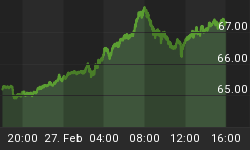All hail the free market system.
When short sellers were pounding Bank of America and Citigroup stock into oblivion in February and prices were nearing zero, the pundits were calling it excessive speculation and blaming the hedge funds. Talk was circulating that the uptick rule should be reinstated. "Short sellers be damned" was the battle cry.
Now that the "earth shattering" Fed bank stress test results have been released, investors have discovered that Bank of America and Citigroup are among the largest banks short on capital. So the next time you see a stock getting pounded do not always think it is excessive speculation. Maybe somebody knows more than you do.
With so much cheap money floating around the United States, what's to stop the Europeans and Asians from turning the Greenback into a carry currency?
Now that the global recession seems to be easing, is there anyone watching to make sure U.S. banks do not start lending our money to higher risk emerging markets? Are there any rules in place that give the U.S. taxpayer the right of first refusal before allowing U.S. banks to move money overseas?
When it was announced this week that Australian and Canadian employers actually hired more workers and U.S. employers let more workers go, did you consider that maybe some U.S. workers left their jobs because they were hired by Canadian and Australian employers?
Is anyone paying attention to what the IMF says? Didn't it say a few weeks ago that there is about $4.1 trillion in existing toxic debt floating around out there? Did anyone even hear the phrase "toxic assets" mentioned at all during the historical bank stress test period?
Not to change the subject but did Swine Flu wipe out the Somali Pirates? They have mysteriously disappeared from the news.
Now back to live action .....
The Euro surged to the upside this week as better than expected U.S. economic data helped shift trader sentiment away from the safe haven U.S. Dollar to the more risk driven Euro.
This week's strong equity markets signaled a demand for higher risk assets and helped drive the GBP USD sharply higher. The appreciation in the Pound encouraged traders to forget about the widening U.K. deficit and contracting economy.
The Canadian Dollar rallied to a 6-week high fueled by a much higher stock market and a break out to the upside in crude oil. Speculators are buying crude oil on expectations that a global economic recovery will drive up demand for this key Canadian export.
Signs of a recovery in the U.S. economy led traders to buy the U.S. Dollar and sell the Japanese Yen as traders attempted to capture the slightly better yield. Globally, the rise in equity markets led to a revival in the carry trade. This is a strategy where investors sell the lower yielding currency to invest in higher yielding assets.
More signs of an economic recovery in the U.S., including better than expected bank stress test results and indications that the rate of U.S. job losses was shrinking, encouraged Swiss Franc traders to repatriate their U.S. investments back to Switzerland. This was another sign that the U.S. Dollar is losing its safe haven status.
The Australian Dollar closed on its weekly high while closing in a position to test a major 50% price at .7928. News that the Reserve Bank of Australia had decided to refrain from cutting its benchmark interest rate fueled the start of this week's rally while bullish investors remained optimistic that an economic recovery in China would lead to greater demand for Australian exports.
The surprise this week was the strong rise in the New Zealand Dollar. This currency rallied as traders chased the higher yielding Kiwi on speculation that the global economy was on the mend. News that China is on the road to recovery is leading traders to speculate the New Zealand economy would soon mount a recovery because of improvements in the demand for exports.















